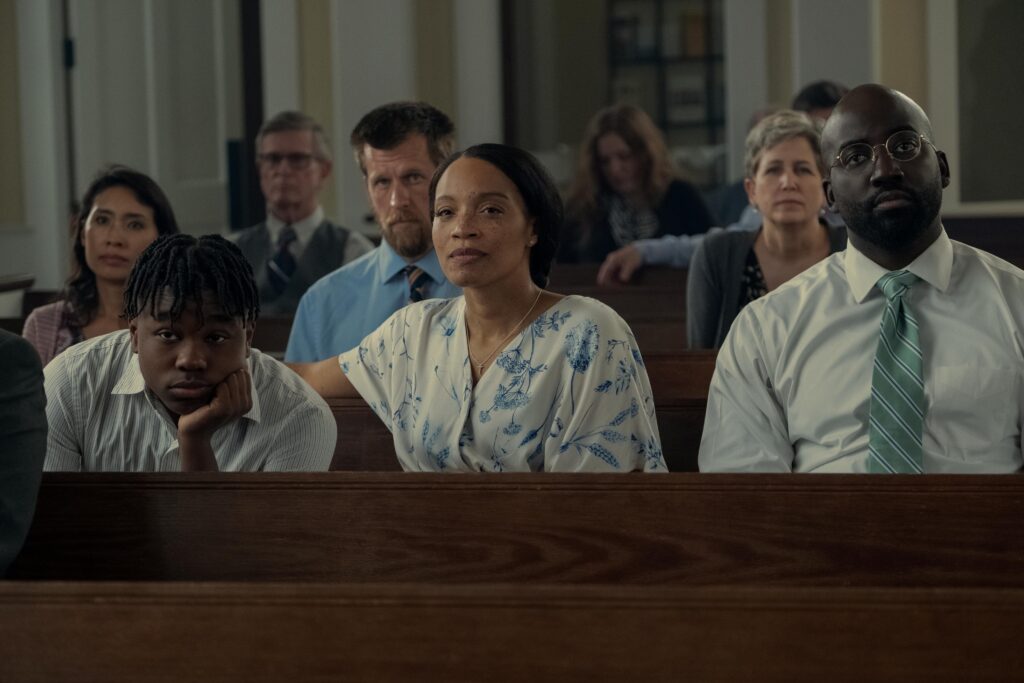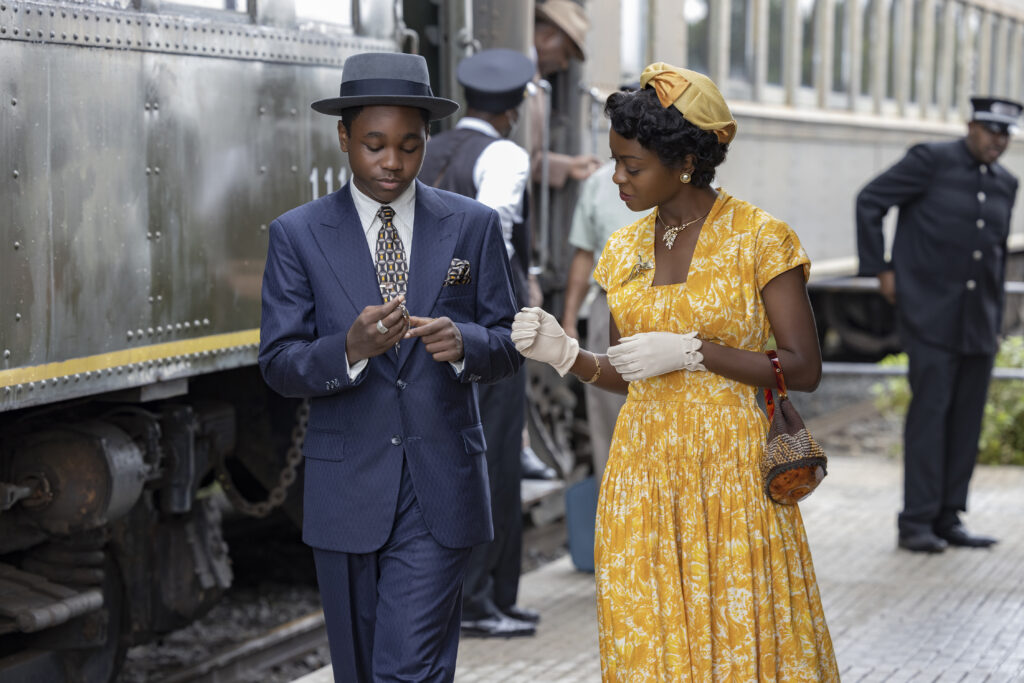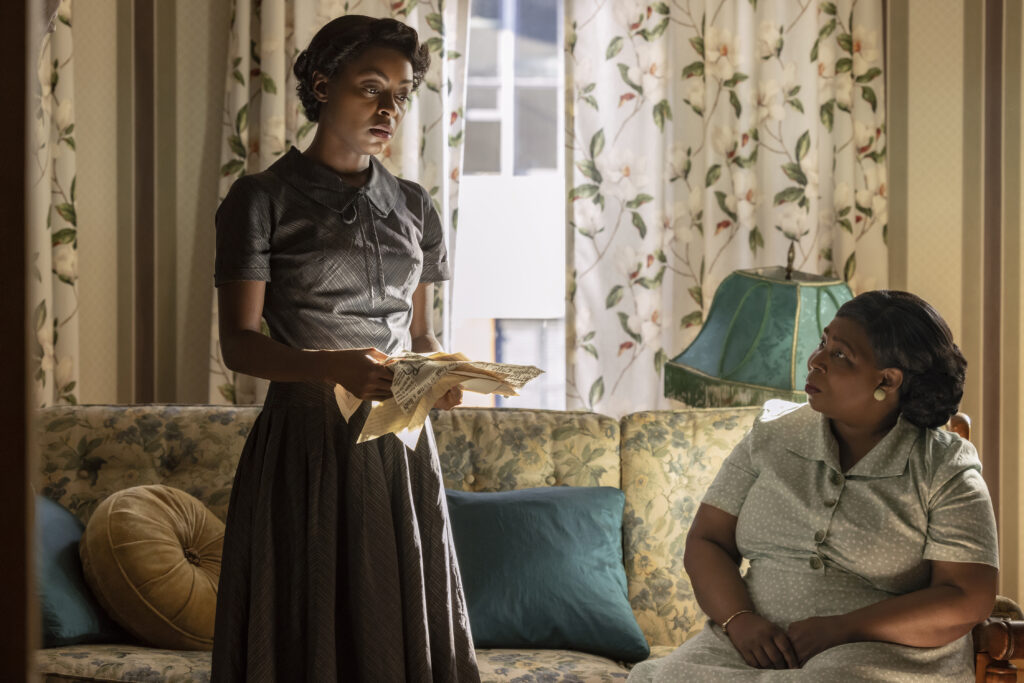December 8, 2022
by Carla Hay

Directed by Miles Warren
Culture Representation: Taking place in the fictional city of Evans, Texas (and briefly in Dallas), the dramatic film “Bruiser” features a cast of African American, white and Latino characters representing the working-class and middle-class.
Culture Clash: A 14-year-old boy from a middle-class family is charmed into rebelling against his parents by a drifter in his 30s who has a criminal record and a connection to the boy’s past.
Culture Audience: “Bruiser” will appeal primarily to people who are interested in watching low-budget and capably made dramas that explore issues about father-son bonding, family trust and teen rebellion.

Troubled relationships between fathers and sons is not a new concept, but “Bruiser” presents it in a thoughtful and artistic way. Although this drama’s story has a big secret that’s easy to figure out, not everything in the movie is predictable. The movie excels in authentically portraying the vulnerabilities of teenagers looking for an identity and independence from family members, as well as how these family dynamics can quickly get messy from miscommunication.
“Bruiser” is the feature-film debut of Miles Warren, who based the movie on his short film of the same name. Warren and Ben Medina co-wrote the feature-length “Bruiser” screenplay. “Bruiser,” the first feature film from Disney-owned Onyx Collective, had its world premiere at the 2022 Toronto International Film Festival, followed by a U.S. premiere at AFI Fest in Los Angeles. It’s not a flashy movie, but it has a compelling, low-budget style that draws viewers into the world of the film’s characters that are realistically portrayed by a talented cast.
In “Bruiser,” the protagonist is 14-year-old Darious Garter (played by Jalyn Hall), who is in eighth grade at a private boarding school in Dallas called St. Andrew. It’s the type of school where the students are required to wear uniforms. Darious is quiet and somewhat introverted. He likes to draw and he has a relatively happy home life, until he meets someone who disrupts Darious’ perception of his family.
At the beginning of “Bruiser,” Darious is on a summer break from school. He has a sort-of girlfriend named Mia (played by Sarah Bock) who comes from a privileged family going to Greece for their summer vacation. Darious is on a financial scholarship to attend St. Andrew. His stepfather Malcolm Garter (played by Shamier Anderson) owns a car dealership called Garter Motors, where Malcolm is the chief salesperson. The dealership has been financially struggling, but Malcolm wants to keep it a secret from Darious and Darious’ mother Monica (played by Shinelle Azoroh), who’s a homemaker.
Monica is the one who picks up Darious from school to drive them back home to Evans, Texas, a rural suburb of Dallas. Darious is feeling restless because he prefers to live in a big city, and he’s already pining for Mia, whom he finds out later isn’t as into him as much as he’s into her. Monica cheerfully tells Darious on the ride back to their home, “Your father and I are so proud of you.”
Darious is mopey though, because he tells his mother that he’s going to be very bored in Evans on this summer vacation. During the ride home, Monica plays her favorite song: Otis Redding’s “Cigarettes and Coffee.” Darious teases his mother about how she always like to play that song, but she laughs off this good-natured ribbing and tells Darious that the song makes her feel happy. It won’t be the last time that “Cigarettes and Coffee” is heard in the movie, which uses the song as a symbol for conjuring up positive feelings.
Back at home, Darious is disappointed when he asks Malcolm if he can have a new bicycle, because he thinks his current bicycle is now too small for him. Malcolm firmly tells Darious no. Darious thinks Malcolm is being unreasonable. What Malcolm doesn’t tell Darious is that he can’t afford to give Darious a new bicycle.
Malcolm soon gets some bad news that he also keeps a secret from Darious and Monica: A St. Andrew school official has called and told Malcolm that Darious’ financial-aid scholarship is being cancelled. Ever the salesman, Malcolm urges the school to seek out other options and says that he expects the school to “make it work” so that Darious (who is a good student) can continue to attend the school on a scholarship.
It’s never been a secret that Malcolm is not Darious’ biological father, but Malcolm is the only father whom Darious has ever known. Darious’ biological father, who abandoned Monica while she was pregnant with Darious, has not been in Darious life ever since. Malcolm and Monica got married not long after Darious was born. Malcolm’s parenting style is loving but strict and stubborn and sometimes quick-tempered, while Monica tends to be more of a calm peacemaker who’s willing to listen and negotiate during a dispute.
Darious tries to reconnect with his hometown friends, but he doesn’t feel as close to them as he used to be. He’s still on good terms with a platonic pal named June (played by Ava Ryback), but Darious starts to have problems with a slightly older teen named Jason (played by Gavin Munn), who’s in the same clique as June. The movie has some subtle and not-so-subtle indications about social-class prejudices, because Darious doesn’t think that that his hometown friends are interesting or sophisticated as his friends at the boarding school.
One day, while hanging out in a woodsy area, Jason starts playfully roughhousing with Darious. The roughhousing turns into a full-on assault, with Jason beating up Darious for no good reason. However, it’s fairly obvious that Jason is jealous that Darious goes to a boarding school, but Jason doesn’t want to admit that to anyone.
A humiliated Darious runs away to a stream to clean up his bloodied face. Near this stream, he encounters a guy living in the houseboat that belonged to a wealthy man in the area named Mr. John. The stranger, who is in his 30s, starts talking to Darious, introduces himself as Porter (played by Trevante Rhodes), and asks Darious who his father is. When Darious tells him, Porter has a look of recognition on his face and says that he knows Malcolm because they both used to work for Mr. John, who committed suicide.
Porter also notices the injuries on Darious’ face and asks what happened. When Darious tells him, Porter advises Darious to learn how to physically fight back against bullies. Porter wonders out loud to Darious what kind of father Malcolm is if Malcolm hasn’t taught Darious how to defend himself in a fight. It’s a foreshadowing of some of the conflicts to come between Porter and Malcolm.
It should come as no surprise that Porter is far from being a role model. He’s living on the houseboat illegally after leaving Las Vegas under suspicious circumstance. And he has a violent and shady past. However, Darious doesn’t know all of that when he first meets Porter, so Darious is intrigued by this tattooed stranger.
During their first meeting, Darious calls Porter “weird.” But over time, as Darious starts to become emotionally distant from Malcolm, Darious seeks out Porter’s company. And it isn’t long before Darious starts calling Porter “cool.”
Porter and Malcolm really do know each other but haven’t seen each other in years. It’s for the most obvious reason possible. Darious eventually finds out this “secret” and discovers that Malcolm wasn’t quite the upstanding citizen that he is now.
Much of “Bruiser” is about the tug-of-war between Porter and Malcolm, as they compete for Darious’ respect, time and attention. Some of this conflict gets very repetitive in the movie, but the pacing and plot developments do a very good job on effectively increasing the tension. It should come as no surprise that things between Porter and Malcolm get worse, with Darious caught in the middle.
One of the best things about “Bruiser” is how it realistically shows that these characters are not stereotypes. There are no absolute “heroes” or “villains” in the story of these feuding men. Porter does a lot of irresponsible things and has a violent past, but he has a noble motive for wanting to be in Malcolm’s life and to prove that he’s not the criminal that he used to be.
Malcolm is a very responsible parent, but his ultra-competitiveness with Porter makes Malcolm lose control and do some irrational things too. Monica tries to be a mediator in the increasingly hostile disputes between Malcolm and Porter. Ultimately, she’s completely loyal to Malcolm.
And where does that leave Darious? Feeling like underage teens often feel: Old enough to make his own decisions but too young to legally be out of his parents’ control. It leads to an emotionally volatile showdown that viewers will see coming, but how it all ends in the movie might not be what most viewers will expect.
Warren’s direction shows that he has a keen eye for casting the right people and allowing time for viewers to get to know the characters in an immersive way. The movie’s dialogue can be a tad simplistic, but it works as well as it does because the actors embody their characters in a way that’s utterly believable. Hall, Anderson and Rhodes give “Bruiser” the spirited energy of portraying two strong-willed men and an impressionable teenage boy who are all battling in some way with insecurities, macho bravado, and what their definitions are to be men.
Most of all, it’s a movie that succeeds in depicting gritty realism and rosy optimism in how people judge what it mean to be redeemable. “Bruiser” doesn’t offer any easy answers. The movie shows how destructive cycles can be difficult to break when they involve several people. But the movie also sends a clear message about the power of individual responsibility and how someone else’s past shouldn’t completely define it.
Onyx Collective released “Bruiser” in select U.S. cinemas for a limited one-week engagement on December 2, 2022. “Bruiser” will premiere on Hulu in the U.S., Star+ in Latin America, and Disney+ in all other territories on February 24, 2023.


